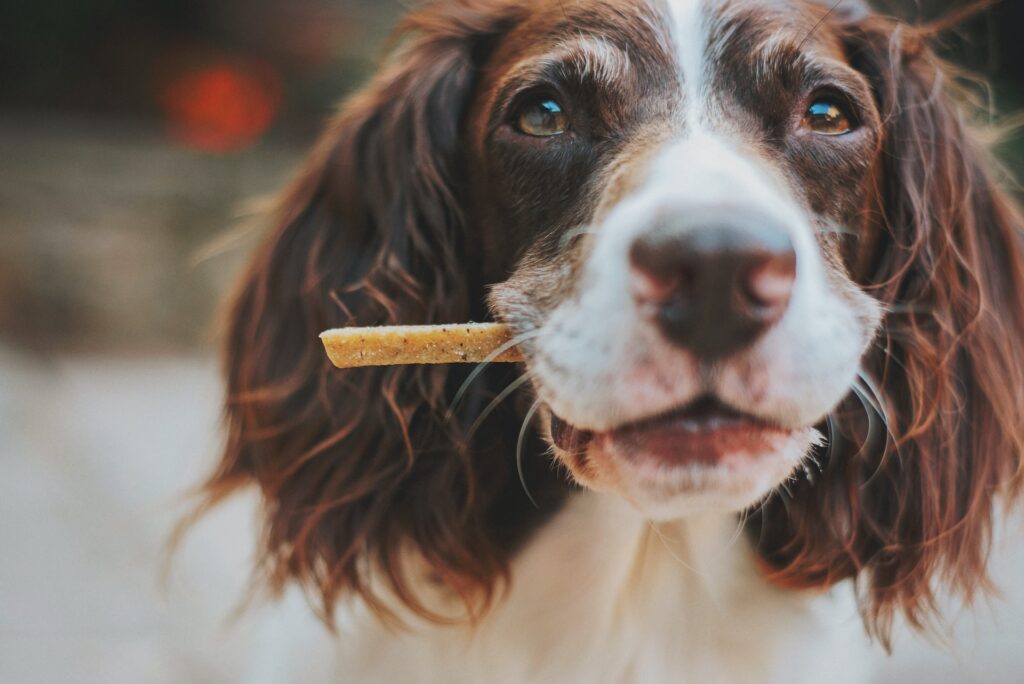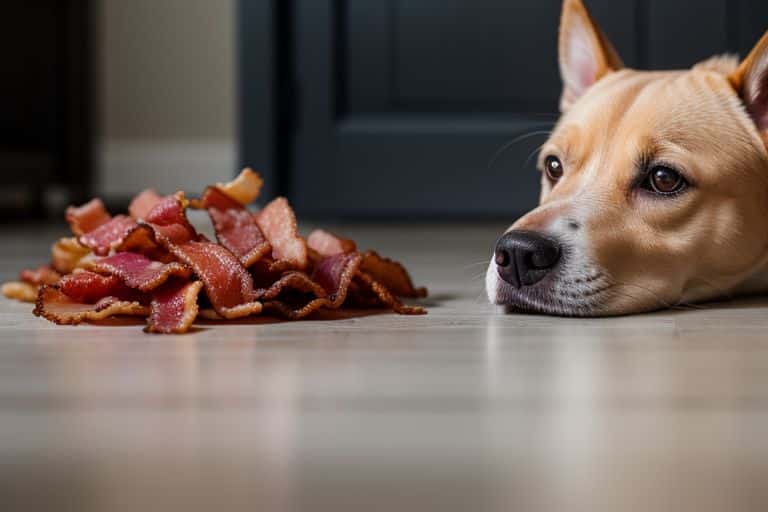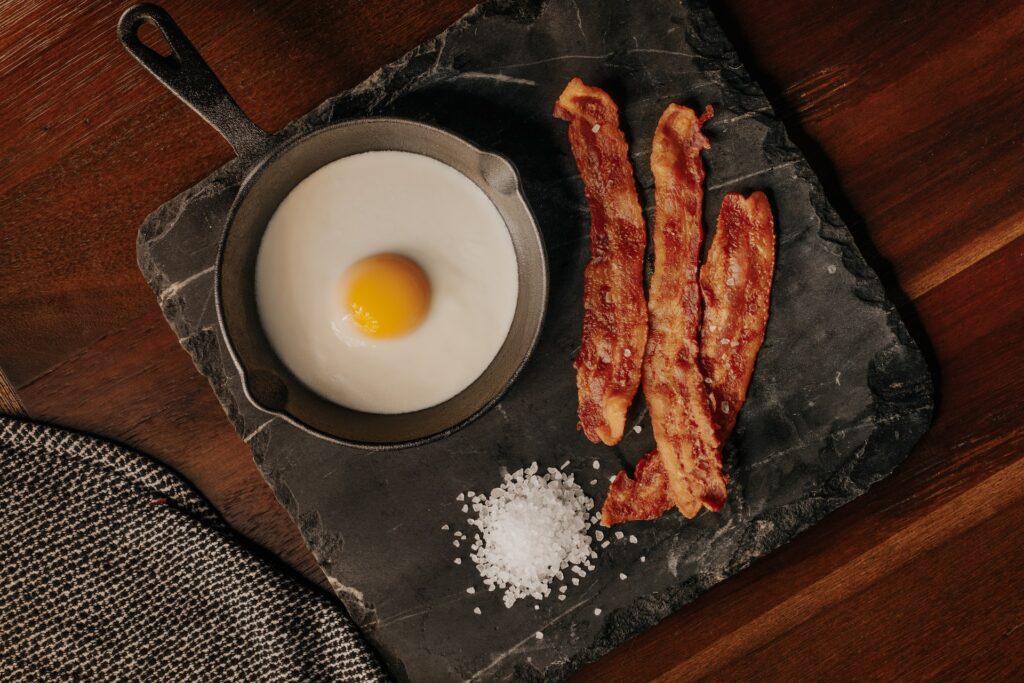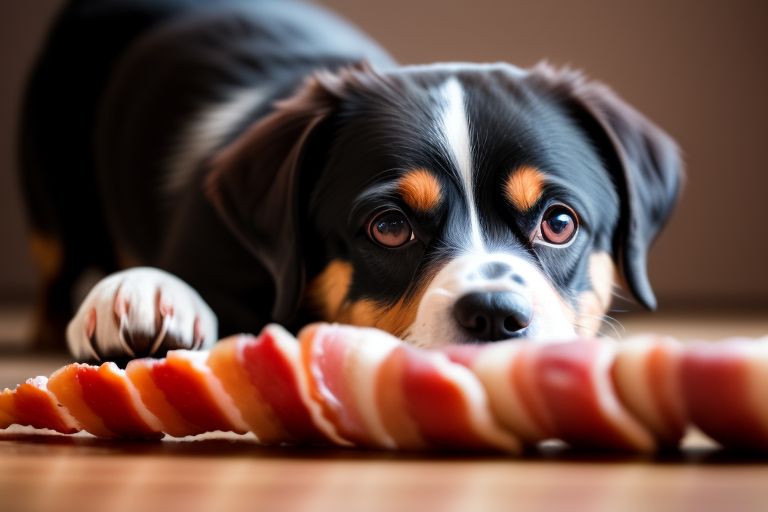For many of us, breakfast is better with bacon. But can dogs eat bacon too? Or is it just for us?
We asked two vets if dogs could eat bacon, and sadly, they said it’s not a good idea. It seems our furry friends won’t benefit from this tasty breakfast treat.
Table of Contents
Also read: Can Dogs Eat Cabbage? How much cabbage is safe to give your dog?

Can dogs eat bacon?
Even though bacon, whether raw or cooked, isn’t exactly toxic for dogs, it’s best to avoid giving it to your pup. Vets recommend against it due to bacon’s high fat and salt levels, which can lead to tummy issues like diarrhea.
If your dog grabs a bit of bacon from the floor, it’s likely okay. But be careful not to let them munch on a whole plate of bacon left out. That could make them feel unwell later.
And remember, regularly giving bacon to your dog can cause more serious problems. So, it’s a good idea to keep bacon as an occasional treat rather than a regular snack.
Is Bacon Bad for Dogs?
Don’t give bacon to dogs; it’s not good for them. Bacon and other pork stuff, such as pork bones, raw pork, and uncooked bacon, are full of salt and fat, which can make pets sick. Eating these can cause problems like getting too chubby and tummy troubles, and right away issues like swelling and inflammation. So, avoid giving your dog bacon as a treat or mixing it with their usual snacks and dog food.
Can dogs eat turkey bacon?
Even meats like chicken, which are low in sodium, can still bring in extra calories. Vets recommend following the ten percent rule, meaning treats shouldn’t make up more than ten percent of your dog’s diet.
To make sure your dog stays healthy and happy, give him small pieces of healthy fruits and veggies or low-calorie dog treats. It’s better not to share your table scraps with him to help him keep a good weight.

Can dogs eat bacon daily?
Try not to give your dog bacon too much because it has a bunch of fat and salt, and that can make him really sick with something called pancreatitis, according to vets.
Pancreatitis needs expensive and intensive hospital care, making the risks much higher than the tasty snack’s benefits. Also, eating fatty foods like bacon often can make your dog gain weight and have clogged arteries.
To keep your dog healthy and happy, it’s best to skip the bacon. Choose dog treats with bacon flavor to make sure your furry friend feels part of the breakfast vibe without risking their health.
The Risks of Bacon for Dogs
The following dangers should be considered when feeding bacon to your dog:
1. Bacon is not good for dogs because it has too much fat and salt. It can make them sick, causing problems like throwing up, stomach pain, and diarrhea.
2. Bacon is frequently spiced with brown sugar, pepper, maple chili, honey chipotle, garlic powder, and onion powder. Each one could make GI issues more likely.
3. The high sodium content of bacon can make you thirstier. Dogs will drink a lot of water after consuming high-sodium meals or snacks. Bloat is a serious emergency condition that can result from this combination.
4. Bacteria and parasites may be present in raw or undercooked bacon. Ingestion of undercooked or raw pork meat transmits the trichinella, also known as trichinosis. Trichinosis symptoms include nausea, vomiting, diarrhea, lethargy, loss of appetite, fever, and aversion to movement because of muscle pain.
5. Pork may cause allergies in some dogs.
6. It is crucial to remember that meals for humans containing bacon might also contain other poisonous components. For instance, a cobb salad with bacon might also contain toxic ingredients for dogs like onion, garlic, raisins, or fresh grapes. When giving leftovers to your dog, use extreme caution.
7. The World Health Organization suggests that processed meats, such as bacon, could be linked to cancer. The substances used to preserve bacon may contribute to heart disease, cancer, and liver problems in humans. Additionally, some dogs may experience stomach issues due to these substances.
8. Dogs who are fed pork bones may choke. Although small dogs are more likely to experience this, all dogs are at risk. Pork bones occasionally have the potential to splinter, cutting the esophagus or oral mucosa.
IMPORTANT NOTE: Dogs can feel sick from different foods, and it’s not the same for every dog. If your dog ate bacon and acts strange, like throwing up or having a runny tummy, call your vet or go to the emergency room for help.

Can dogs eat raw bacon?
It’s highly recommended that you never feed your dog raw bacon due to the considerable health risks involved. Avoid giving your animal companions uncooked bacon because it can harbor a significant number of dangerous bacteria and parasites commonly present in raw meat.
Are bacon-based dog foods available?
Bacon flavoring is a common ingredient in dog treats and foods. Moreover, pork often forms the basis of high-quality dog foods, including grain-free alternatives. For dogs with allergies to chicken or beef, dog foods featuring pork as the primary ingredient may be recommended. Learn more about your dog’s dietary needs here.
The Safest Method for Feeding Dogs Bacon
If you’re thinking of sharing bacon with your dog, the safest way is to give him a small, crispy piece with the extra grease drained off. Cooking bacon until it’s crispy helps remove most of the fat. After cooking, place the hot bacon on a plate covered with paper towels to absorb any remaining grease.

How much bacon should a dog eat?
If your dog enjoys bacon and doesn’t feel sick afterward, you can share a bit with him. For smaller dogs (less than 20 pounds), a tiny piece, like 1/8 to 1/4 of a strip, is plenty. Medium-sized dogs (between 21 and 55 pounds) can have about half a strip, and larger dogs can have 3/4 to a whole strip without any issues.
Final thoughts: Can dogs have bacon?
Dogs like raw meat because it’s simple and doesn’t have things that can upset their stomachs.
It’s best not to give dogs bacon, but if you really want to treat them, go for cooked bacon. It has a great taste, a nice feel, and is less likely to make them sick. Cooked bacon smells really good, especially to dogs with their super-strong sense of smell, which is way better than ours!
References: thedodo.com, masterclass.com. Photos Sources: Unsplash